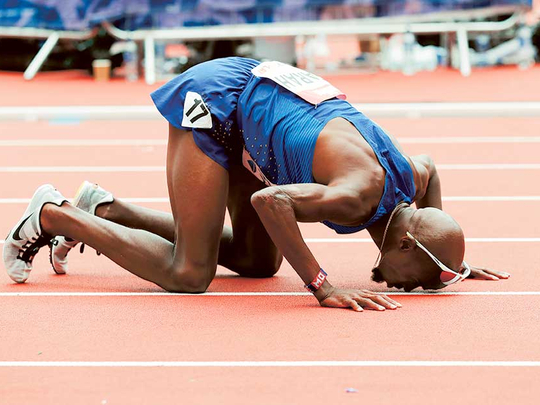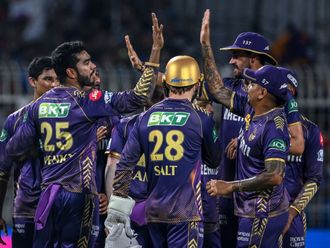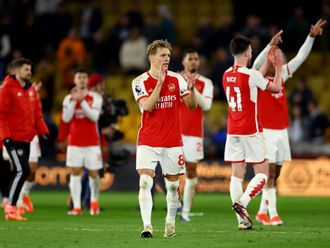
London: It became the image of London 2012: Mo Farah crossing the finish line, arms outstretched, eyes wide in disbelief as he won his second gold. Now, as he prepares for Rio de Janeiro and what will almost certainly be his final Olympics, Farah is hoping to repeat his success and win both the 5,000m and 10,000m – a feat that would make him Britain’s greatest athlete. “I remember when London got the bid [in 2005]. I stopped at a garage to watch the news,” says Farah, 33, who was born in Somalia to British-Somali parents, and moved to London when he was eight.
“For seven years I dreamt of winning. And then it does happen, and you’re not dreaming.
“To win double Olympic gold again would be incredible.”
Farah became a national hero after the London Games, and admits he was not prepared for how his life would change – when at home in London, he cannot even go to the supermarket without being stopped for selfies.
“I’ve become someone else, really. Everything I do and say is different now.”
He has had to get used to intense media scrutiny, which escalated last year when his coach, Alberto Salazar, was accused of having given a banned testosterone supplement to Farah’s training partner Galen Rupp, a claim Salazar denies.
Salazar was cleared in a US investigation – Farah, who was never accused of doping, released his blood test results and has always stuck by his coach. But he is not yet in a conciliatory mood.
“People look at you differently and I just want to show people that I’m always 100 per cent behind clean sport. I believe anyone caught with drugs should be banned for life.”
Understandably, he finds talk of drug-use frustrating, given the extraordinary training regimen he puts himself through.
“It’s so easy to think, ‘Whoa, he must be doing something,’?” he says. “No. Come join us, see the reality of what I have to do to achieve what I achieve. There is no cutting corners.”
Until 2011, Farah had been ranked fifth in his two disciplines. That year, he moved to Portland, Oregon, to start training with Salazar, and quickly moved up the ranks. His schedule is punishing – he runs up to 120 miles a week, uses a hi-tech water treadmill, sleeps in an oxygen tent, and switches between climates and altitudes. He never takes a day off training, even managing a five-mile run on the one day he was sick earlier this year, and he wears out a new pair of trainers every week.
The signs are good: last week, at the London Anniversary Games, he stormed to victory in the 5,000m with the fastest time in the world so far this year.
Farah, speaking from the French Pyrenees, where he is putting in some last-minute high-altitude training before Rio, says he has little time for anything else.
“I’ll Skype the family, and I might play a bit on my PlayStation. But generally I’m exhausted, so spare time is spent resting. It’s hard, but that work you put in, it’s so worth it to win a medal.”
Farah’s wife, Tania, whom he met as a teenager at Feltham Community College, and their children – Rhianna, 11, who is from Tania’s previous relationship; twins Aisha and Amani, four; and Hussain, nine months – have taken well to life in the US. The children are developing American accents and Farah does not know if they will return to London even after he retires.
When he can, Farah takes Rhianna to swimming competitions, and the twins to the local playground, where they are already showing athletic prowess.
“Amani is so determined – she will climb on the monkey bars with blisters on her hands and never gives up. She’s amazing.”
A new BBC documentary, which follows Farah over weeks of competition and training, sees him at home, braiding his daughters’ hair and reading to them. He had his two Olympic medals inscribed with the names of his twins who were born just after the Games. His training often takes him away from them.
“I want to spend as much time as I can with my kids, but I know the opportunities in athletics don’t often come around,” he says.
“The main struggle for me is missing them. Aisha said the other day, ‘Why does daddy run? Can’t he stop and come home now?’ Oh, man, as a parent, that’s hard.
“That moment, growing up, I can never get it back and it makes me feel sad. I want to be as close to them as I can because, growing up, I wasn’t really close to my dad.”
Farah was born in Mogadishu and moved to neighbouring Djibouti aged four; there, his family endured grinding poverty. His home was a shack with a tin roof; eight people slept in one room. They played in sewage-filled streets and got up at 5am to sell samosas in the street.
Farah’s mother took him to live in London with his British father when he was eight; his twin brother Hassan would have gone, too, but there was little money for him to travel. A confused young Farah only realised that his brother was never coming after his parents split up and his mother returned to Africa, leaving Farah to live with an aunt in Hanworth, south-west London.
“Suddenly I was on the other side of the world, and he was still there,” he says. “I didn’t know if I would ever see him again.”
The brothers were reunited after 12 years at Hassan’s wedding. Hassan spent years as a travelling salesman, displaced by civil war, while his brother was training in London, but Farah says neither believes in dwelling on the past.
Hassan still lives in Somalia, so the brothers see each other rarely but speak often. Farah is still close to his mother, Amran, who is in Somalia.
“She won’t watch me on television,” he says, laughing. “She’s so proud, but she doesn’t quite understand why I put myself through it.
“She thinks I’m killing myself every time. When I’m on the floor after a race, she’s tearful and worried about me. And I get the whole, ‘Oh my God, you’re too skinny!’ stuff.”
Farah’s relationship with his father, Muktar, which had never been close, broke down during the divorce and the pair rarely speak now; Farah has not seen him for a year.
“We don’t have a relationship,” he says. “I respect him because he’s my father, but I don’t pick up the phone and call him.
“It’s just a bit hard because I have my own family now.”
Farah has made enormous sacrifices and now hopes it will pay off this summer in Rio. After that, he has some big decisions to make.
Perhaps there is a hint in the fact he has just published his first children’s picture book, ‘Ready, Steady, Mo!’, about a boy runner.
“I don’t know what I’ll do exactly, but I’ve thought about it and I’d like to do something with kids in sports. There’s a lot more potential there that we can tap in to as a country.
“I couldn’t just retire and do nothing. I love it too much.”












